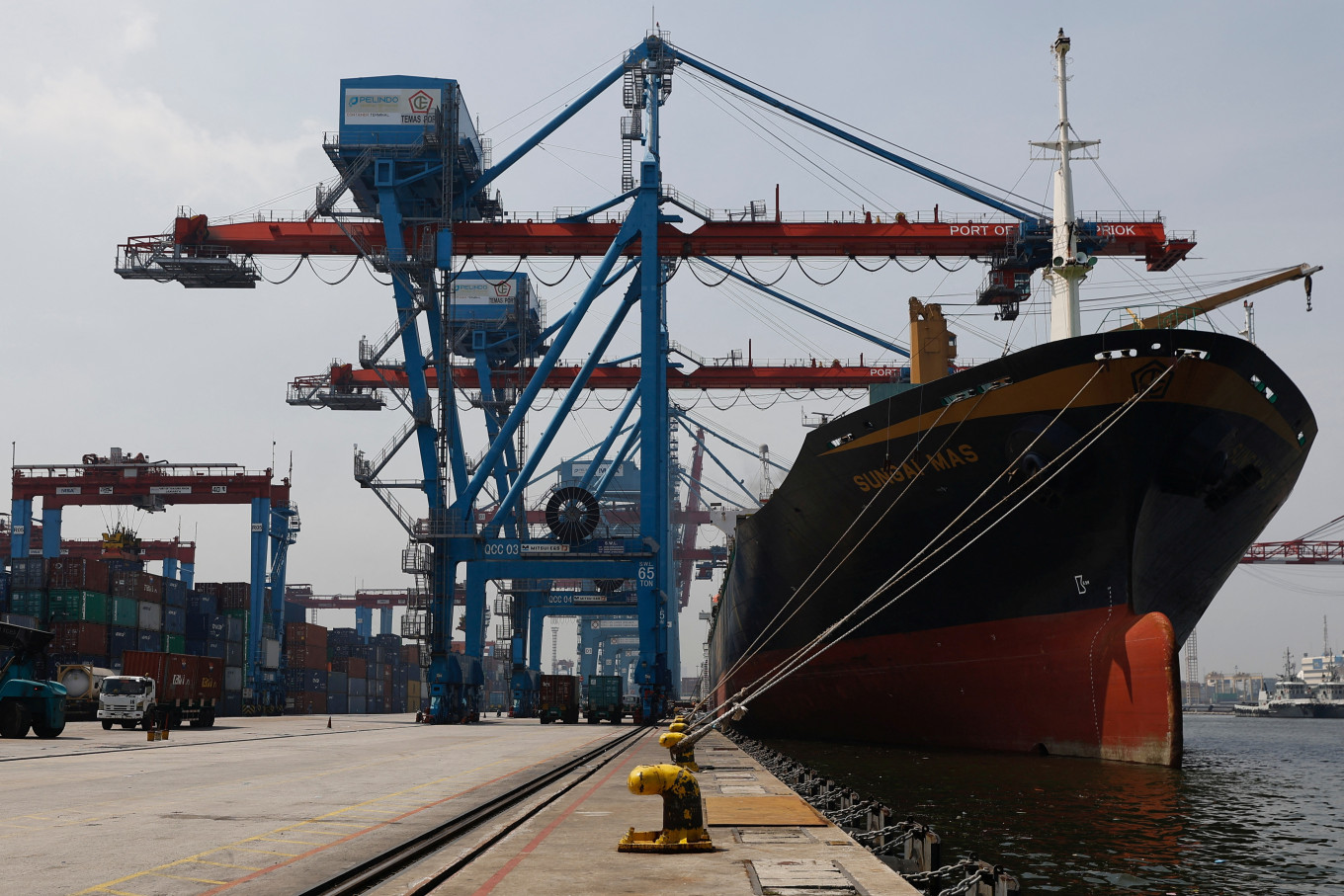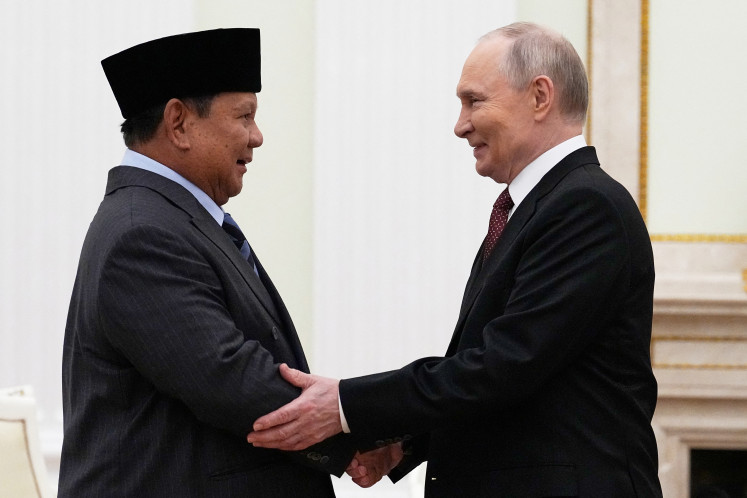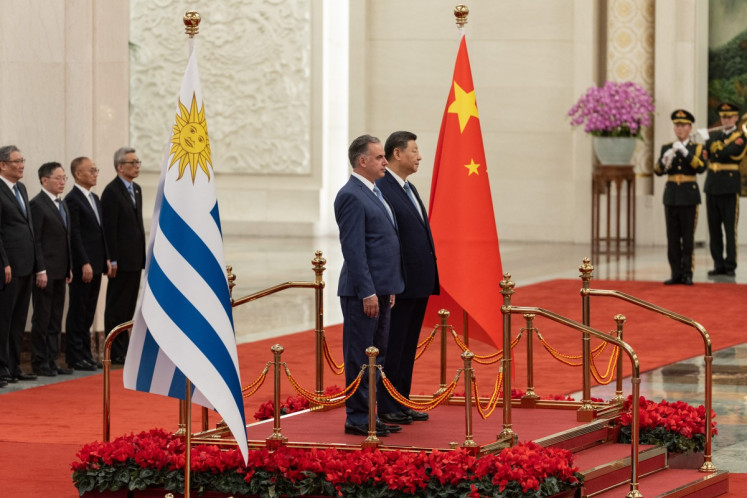Popular Reads
Top Results
Can't find what you're looking for?
View all search resultsPopular Reads
Top Results
Can't find what you're looking for?
View all search resultsEconomic fears can create a self-fulfilling prophecy – don’t let them
Today’s hailstorms of hostility are already hitting economies around the world, with businesses and individuals taking shelter from the unpredictable conditions.
Change text size
Gift Premium Articles
to Anyone
R
hetoric and reality are not the same thing, but the difference is often indiscernible. That is what we are seeing in the financial system today, where hostile language and tit-for-tat tariffs are unleashing uncertainty and volatility to such an extent that a self-fulfilling dynamic is taking shape. Words are reshaping our world.
The United States’ changing policy paradigm is clouding the horizon, creating an atmosphere heavy with unpredictability. Precise forecasts of what awaits us are becoming impossible, but one thing is clear – a climate of fear is spreading.
Businesses are hitting pause on capital spending. Consumers are fretting about their finances and the cost of everyday goods. People around the world are worried about their investments and pension pots.
References to recession risk are mounting, particularly in the US, where consumer confidence is falling at its fastest pace since COVID-19 cases and inflation spiked in August 2021. Ipsos’ Global Consumer Confidence Index showed significant drops in consumer sentiment in seven countries in February, and CNN’s Fear & Greed Index of market sentiment flipped towards “extreme fear” in early March, from “neutral” weeks earlier.
“Nothing is more uncertain than the future,” said the Latin writer Publilius Syrus 2,000 years ago, and this maxim is resonating loudly and clearly today. The Global Economic Policy Uncertainty Index has jumped after two years of steady decline, and the United Nations is blaming “persistent uncertainties” for a “subdued global outlook”.
The result is that the risk of economic dislocation is rising. What can countries on the receiving end of this uncertainty do to soften the blow? The obvious answer to a downturn is to lower interest rates, but some have more room to maneuver than others.
Only the European Central Bank appears to be in a position to ease cyclical pressures by continuing to cut rates, according to Union Bancaire Privée, as a trade war would threaten eurozone growth more than inflation.
Among the other targets of US tariffs, Canada is seen as increasingly likely to opt for a supersize rate cut to protect its citizens. Given that the US accounts for three-quarters of Canada’s goods trade, the effects of not taking action could be severe.
China is also expected to make two or three cuts to its benchmark one-year lending rate this year, reducing it from 3.1 percent to 2.5 percent. A similar series of cuts to reserve requirement ratios is also anticipated, giving financial institutions more leeway for lending and investment.
In the world’s fifth-largest economy, India's central bank has made its first rate cut in almost five years, lowering the key repo rate at which it lends to commercial banks by 0.25 points to 6.25 percent.
As for the US, stubbornly high inflation means the Federal Reserve will find itself limited in its ability to snip the reins on rates that might be holding back the economy. Yet given the dollar’s heavy role in global financial systems, US moves could tip the balance on monetary policy globally.
Another measure that some may turn to is reciprocal tariffs, but this is only going to make the clouds on the economic horizon darker and denser. If seeing a way ahead in such conditions becomes impossible, trading relationships will start to break up.
New empirical research from the World Economic Forum points to the implications this would have on GDP and inflation, with the Navigating Global Financial System Fragmentation report suggesting potential losses to economic output of US$600 billion to $5.7 trillion per year, equivalent to 5 percent of current GDP and double the impact of the pandemic.
This fragmentation would also push inflation upwards, by 5.5 percent in a worst-case scenario or 0.6 percent if the divisions are less wide-ranging.
These economic earthquakes would not spare larger economies, with the US facing a hit of 1.8-2.3 percent to its GDP compared with IMF forecasts, China at risk of losing 3.7-4.4 percent and Brazil potentially knocked back by 3.6-4.3 percent. As for the world’s fastest-growing major economy, India could see 4.6-6.6 percent carved off its GDP.
Today’s hailstorms of hostility are already hitting economies around the world, with businesses and individuals taking shelter from the unpredictable conditions.
This could become particularly pronounced in the case of retirees. Most are already somewhat unsure about how much they can safely spend in retirement, but World Economic Forum research shows that adding in concerns about financial volatility means spending from this part of the population is at risk of receding.
The Forum’s Global Retail Investing Survey finds that across 13 countries, 44 percent of those surveyed are worried about outliving their savings. If more money remains unspent, the economy will feel the impact. With retail investors inclined to tighten the purse strings in uncertain times, “unpredictability” drives 20 percent of investment avoidance – fear of a financial downturn could easily become a self-fulfilling prophecy.
In response, the Forum’s new Future-Proofing the Longevity Economy report highlights retirement system innovations that are strengthening financial security in times of uncertainty. For example, Malaysia’s Employee Provident Fund (EPF) has grown to cover more than 16 million workers, while Singapore’s Central Provident Fund (CPF) incorporates risk-pooling elements into its defined contribution scheme to provide retirees with a stable, lifelong income stream.
Hunkering down and hiding from this unpredictability may be an instinctive response for some, but it will not provide long-term safety or the best way out when the situation changes.
The answer for business leaders is not to lean away from the unrest, but to buckle up and lean in. Be prepared for the unexpected and proactively engage with customers, shareholders and policymakers on the prospects ahead. Engage with other business leaders on shared opportunities and concerns. Make the most of global platforms that bring together public and private-sector leaders, such as the World Economic Forum.
The economic clouds will clear and the horizon will brighten, we just don’t know when. Those who prepare for the rain and the shine will be best placed, however things play out.
***
The writer is World Economic Forum’s head of Centre for Financial and Monetary System.











